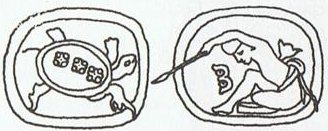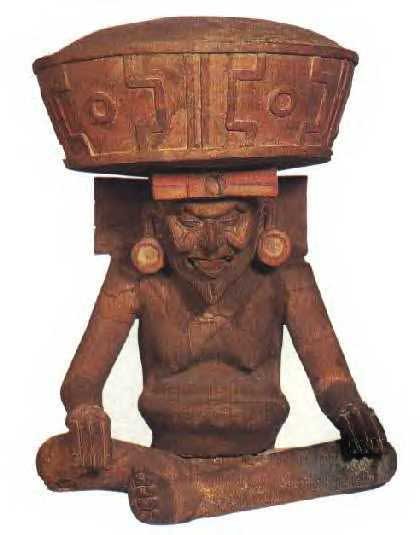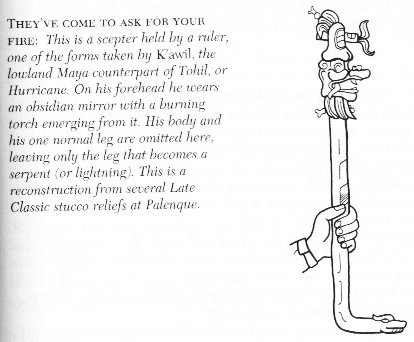Possibly the summer half of the year had its tail end cut off at day 378 (the measure defined by the synodic cycle of Saturn). ... Midsummer is the flowering season of the oak, which is the tree of endurance and triumph, and like the ash is said to 'court the lightning flash'. Its roots are believed to extend as deep underground as its branches rise in the air - Virgil mentions this - which makes it emblematic of a god whose law runs both in Heaven and in the Underworld ... The month, which takes its name from Juppiter the oak-god, begins on June 10th and ends of July 7th. Midway comes St. John's Day, June 24th, the day on which the oak-king was sacrificially burned alive. The Celtic year was divided into two halves with the second half beginning in July, apparently after a seven-day wake, or funeral feast, in the oak-king's honour ... ... 188 (*JULY 7) + 7 = 195 (*JULY 14), and the 2nd half of the year should therefore begin after *Ca14-3 ... 378 - 366 = 12 and 378 could refer to 12 days after the Tail of the Horse (Ma Wei, δ Centauri) = *JULY 14 (*115 = 183 - 68) + 12, i.e. at Cor Caroli in *127 (*JULY 26) = *JANUARY 25 (390) - 183 - 80:
There could have been 30 dark nights from 12 * 29½ = 354 (*DECEMBER 20) to *JANUARY 19 (on average the coldest day of the year north of the equator).
Saturn, the dark planet dwelling in the background - 'Dripping Water' - seems to have corresponded to the opposite (or rather to the complementary shadow figure) of the giant planet Jupiter - Jus Piter (Father Light). Jupiter was ruling the daylight of summer and Saturn the winter nights, and as his tanist he had to be equipped with a spear made from ashwood - what remains after a fire has gone out.
And the positive aspect could have been underlined - of how a new generation would grow from the ashes once the rain had arrived.
... His wife sang a dirge of lament, but did precisely as she was told, and in the morning she found her house surrounded by a perfect thicket of vegetation. 'Before the door,' we are told in Thomas Thrum's rendition of the legend, 'on the very spot where she had buried her husband's heart, there grew a stately tree covered over with broad, green leaves dripping with dew and shining in the early sunlight, while on the grass lay the ripe, round fruit, where it had fallen from the branches above. And this tree she called Ulu (breadfruit) in honor of her husband ...
With 'corresponding to' I mean possessing a remarkable accumulation of positive correlations. Thus Saturn also corresponded to Tezcatlipoca (Smoking Mirror): ... But the time of his predestined defeat by the dark brother, Tezcatlipoca, was ever approaching, and, knowing perfectly the rhythm of his own destiny, Quetzalcoatl would make no move to stay it. Tezcatlipoca, therefore, said to his attendants, 'We shall give him a drink to dull his reason and show him his own face in a mirror; then, surely, he will be lost'. And he said to the servants of the good king, 'Go tell your master that I have come to show him his own flesh!' But when the message was brought to Quetzalcoatl, the aging monarch said, 'What does he call my own flesh? Go and ask!' And when the other was admitted to his presence: 'What is this, my flesh, that you would show me?' Tezcatlipoca answered, 'My Lord and Priest, look now at your flesh; know yourself; see yourself as you are seen by others!' And he presented the mirror. Whereupon, seeing his own face in that mirror, Quetzalcoatl immediately cried out, 'How is it possible that my subjects should look upon me without fright? Well might they flee from before me. For how can a man remain among them when he is filled as I am with foul sores, his old face wrinkled and of an aspect so loathsome? I shall be seen no more, I shall no longer terrify my people'. Presented the drink to quaff, he refused it, saying that he was ill; but urged to taste it from the tip of his finger, he did so and was immediately overpowered by its magic. He lifted the bowl and was drunk. He sent for Quetzalpetlatl, his sister, who dwelt on the Mountain Nonoalco. She came, and her brother gave her the bowl, so that she too was drunk. And with all reason forgotten, the two that night neither said prayers nor went to the bath, but sank asleep together on the floor. And in the morning Quetzalcoatl said, in shame, 'I have sinned; the stain of my name cannot be erased. I am not fit to rule this people. Let them build a habitation for me deep under the ground; let them bury my bright treasures in the earth; let them throw the glowing gold and shining stones into the Precious Waters where I take my nightly bath. And all this was done. The king remained four days in his underground tomb, and when he came forth he wept and told his people that the time had come for his departure to the Red Land, the Dark Land, the Land of Fire ...
Early on side a of the G tablet was heliacal Aldebaran, which was named Furrow of Heaven by the Babylonians. This was like a grove in the sky. ... Grove by doing it with Trunk produced the ashwood ... ... For three days all household fires remained extinct as a preparation for the solemn renewal of the fire, which took place on the fifth or sixth day after the winter solstice. The ceremony was performed with great pomp by the same officials who procured the new fire from heaven by reflecting the sun's rays either from a metal mirror or from a crystal on dry moss. Fire thus obtained is called by the Chinese heavenly fire and its use is enjoined in sacrifices: whereas fire elicited by the friction of wood is termed by them earthly fire, and its use is prescribed for cooking and other domestic purposes ... 'About the beginning of April' - when the Chinese used their wooden clappers - could have been referring to the time when Cor Caroli was at the Full Moon (cfr *Ca14-15). 14 * 15 = 210 (7 * 30) and 210 + 180 (6 * 30) = 390 (13 * 30). Wooden clappers should be a sign of the situation down on earth - the earthly fire was missing. ... They walked in crowds when they arrived at Tulan, and there was no fire. Only those with Tohil had it: this was the tribe whose god was first to generate fire. How it was generated is not clear. Their fire was already burning when Jaguar Quitze and Jaguar Night first saw it: 'Alas! Fire has not yet become ours. We'll die from the cold', they said. And then Tohil spoke: 'Do not grieve. You will have your own even when the fire you're talking about has been lost', Tohil told them. 'Aren't you a true god! Our sustenance and our support! Our god!' they said when they gave thanks for what Tohil had said. 'Very well, in truth, I am your god: so be it. I am your lord: so be it,' the penitents and sacrificers were told by Tohil. And this was the warming of the tribes. They were pleased by their fire. After that a great downpour began, which cut short the fire of the tribes. And hail fell thickly on all the tribes, and their fires were put out by the hail. Their fires didn't start up again. So then Jaguar Quitze and Jaguar Night asked for their fire again: 'Tohil, we'll be finished off by the cold', they told Tohil. 'Well, do not grive', said Tohil. Then he started a fire. He pivoted inside his sandal ...
|
|||||||||||||||||||||||||||||||||||||||||||||||||||||||||||||||||||||||||||||||||||||||||||||||||||||||||||||||||||||||||||||||||||||||||||||||||||||||||||||||||||||||||||||||||||||||||||||||||||||||||||||||||||||||||||||||||||||||||||||||||||||||||||||||||||||















